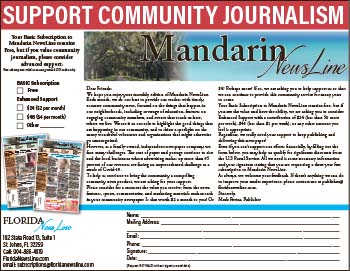By Brett Nolan
mail@floridanewsline.com
New Yorker turned Floridian, Major William Wirt Webb, was ready to encompass his life in everything citrus down south. After retiring as an army officer following the Civil War, Webb’s dream of days spent on a wide veranda with the perfume of thousands of orange blossoms filling the sweet southern air in Mandarin was becoming reality. Years of planning solidified his relocation from the North. His army friends had painted a picture of the new state of Florida so enticing that, by 1875, Webb bought 31.2 acres on the river in Mandarin for $1,500. He believed Florida would be the fruit region for the entire country in 10 years.
Only a year later, Webb completed a two-story barn with attached shelter, inscribed on the top with the year 1876. Constructed of wood from local cypress trees, known for their “knees” that snorkel above the water’s edge, and act as a natural insect repellent, the barn has been standing nearly 150 years. Built off the ground, it was never used to house livestock; rather it was storage for tools, equipment and produce. A large swinging door with a pulley arm extends off the top story indicating its use as a hayloft.
The citrus industry was prodigious along the St. Johns River; Webb’s orange grove alone was comprised of 600 trees. The barn helped support the operations of one of the most successful enterprises in the area, as Webb built a thousand-foot wharf extending into the river where steamers stopped to get thousands of boxes of oranges, vegetables, and strawberries for shipping up north every season.
When Walter Jones and his family acquired the homestead in 1902, the barn continued to act as a storage facility, housing day-to-day objects necessary for living in rural Florida. While Webb made his living cultivating the land, Jones served as the postmaster for the growing village of Mandarin at the store and post office down the road, which he built in 1911.
Walter Jones died in 1928 and his daughter Agnes Jones took over. She was the first postmistress and the last; by 1964 a modern post office opened on State Road 13, making the former obsolete. Miss Jones packed everything up, relocating post office documents, receipts and other items from the store, safely putting them in the barn where they would sit over the following decades. The barn was now more important than ever. This decision allowed the then newly-formed Mandarin Museum and Historical Society a plethora of resources which helped in restoring the old Mandarin Store and Post Office into a museum by the late 1990s.
Today, the Mandarin Museum and Historical Society uses the barn to display artifacts from various industries that were part of the community’s early life, including the citrus, timber, turpentine and cane syrup industries. One of the artifacts housed in the barn is an old doctor’s buggy, which was made lightweight in order to get to a patient’s house more quickly. The barn is located in the Walter Jones Historical Park and still stands tall as a testament to the stories of Mandarin’s fascinating past.
Information for this article was taken from “I Am a Full-Fledged Floridian Now” by Bob Nay, “Mandarin on the St. Johns” by Mary Graff and from Karen Jones Roumillat, a descendent of Walter Jones.
Brett Nolan is a volunteer with the Mandarin Museum & Historical Society. Visit www.mandarinmuseum.net for more information about Mandarin’s history and museum and historic building schedules.
Photo courtesy Mandarin Museum & Historical Society.
The 1876 Webb Barn







